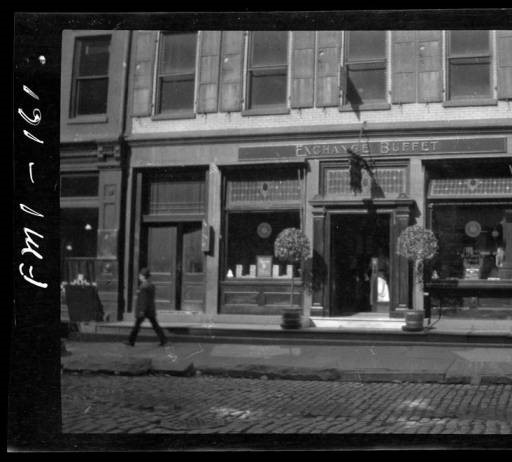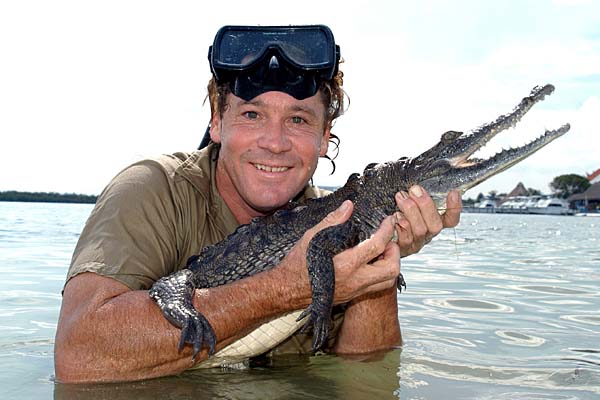Pandas basically only eat bamboo, which also happens to be incredibly hard to digest. Please don't try this at home.
That means that they must eat about 30 pounds of the stuff each day to get enough nutrients—defecating about four-fifths of what they eat (and even what they do digest is not especially easy on their gastrointestinal system).
So now you know.
September 4, 1936 -
The George Stevens' helmed sixth Astaire and Rogers film, Swing Time, co-starring Helen Broderick, Victor Moore, Betty Furness, and Eric Blore, went into limited release in the US on this date.
The film originally began with a musical number, It's Not in the Cards, which was cut due the film's length and because the number was judged as not very good. Only a bit remains in the final version. The music is also used in the background during the first few scenes.
September 4, 1942 -
Warner Brothers reunited most of the cast of The Maltese Falcon for John Huston's war drama, Across the Pacific, which premiered on this date.
Across the Pacific may be the title but the narrative never actually gets there. It starts in New York City (Governors Island), moves to Canada, back to New York, and continues south along the US coast (North Atlantic Ocean) to the Caribbean Sea, where it ends at or near Balboa, Panama, still some 40 miles short of the Pacific.
September 4, 1951 –
The first national live television broadcast in the U.S. took place when President Harry Truman's speech at the Japanese Peace Treaty Conference in San Francisco, California was transmitted to broadcast stations in local markets across the country.
It has been estimated that more than 40 million people saw the president open the Peace Treaty Conference; it was the largest single television audience to date.
September 4, 1953 -
The science fiction film Project Moonbase, based on a story by Robert A. Heinlein and directed by Richard Talmadge was released in the US on this date.
This movie and Cat-Women of the Moon were made using the some of the same sets and costumes. The two films were then released within one day of each other.
September 4, 1970 -
The Rolling Stones release their second live concert album Get Yer Ya-Ya's Out!: The Rolling Stones in Concert, on this date. It was recorded in New York City and Baltimore in November 1969.
The album is often considered by critics as one of the greatest live albums ever made.
September 4, 1971 -
Uncle Albert/Admiral Halsey by Paul and Linda McCartney topped the charts on this date.
Linda McCartney is credited as a co-writer on this song with Paul. She sang background and contributed some of the vocal ideas, but how much she actually wrote on the song is questionable. Paul had some incentive to credit her as a songwriter: under a deal he signed with The Beatles, songs he wrote until 1973 were owned by Northern Songs publishing and Maclen Music. By splitting the credits with his wife, he could keep half the royalties in the family. The publishers brought a lawsuit against Paul for this practice, which was settled out of court.
September 4, 1972 -
The game show The Price is Right, featuring the host Bob Barker, premiered on CBS-TV on this date.
The final three pricing games played on Bob Barker's final show ('Double Prices', 'Bonus Game', and 'Any Number') were the first three games played on his first show, but in reverse order. On Decades week on the season 44 premiere in September 2015 the games were replayed in the same order as the show's premiere on September 4th 1972, and on June 26th 2023 the final show in the Bob Barker studio 33 to air, the games were again played in the reverse order.
September 4, 1976 –
One of the biggest disco hits of the era, You Should Be Dancing by the Bee Gees reached No. 1 on the Billboard charts on this date. (Along with Jive Talkin', this is one of two Bee Gees songs on the Saturday Night Fever soundtrack that had already been released.)
You Should Be Dancing was included on the soundtrack along with five other songs performed by the Bee Gees (plus another they wrote: If I Can't Have You by Yvonne Elliman). The album sold over 15 million copies in the US, marking the Bee Gees as a disco act when their earlier output was more charitably classified as blue-eyed soul.
September 4, 2007 -
The Bob Dylan "biographical" movie, I'm Not There: Suppositions On A Film Concerning Dylan, premieres at the Venice Film Festival on this date.
Todd Haynes needed to get approval from Bob Dylan to use his music, since (unlike in his Velvet Goldmine where David Bowie did not give his permission for his music) he felt the film would not work without it. At the encouragement of Dylan's manager, Haynes wrote a one-page summary of his concept and the characters, which Dylan approved. It took another 6 years to get the film made due to funding difficulties.
Another book from the back shelves of The ACME Library
Today in History:
September 4, 1781 -
Captain Rivera y Moncada (good friend of Uncle Porky) on the behest of the Mexican Provincial Governor, Felipe de Neve, led eleven Mexican Pobladores and their families, 46 settlers in all, established Our Pueblo by the River of Our Lady of the Angels of Uncle Porky near the the river they had seen 11 years earlier - (El Rio de Nuestra Senora la Reina de Los Angeles de Porciuncula.)
Los Angeles was founded on this date.
September 4, 1882 -
Thomas Edison displayed the first practical electrical lighting system on this date.
He successfully turned on the lights in a one square mile area of New York City (NY's Pearl Street Station). This is considered by many as the day that began the electrical age.
September 4, 1885 -
The world's first cafeteria, The Exchange Buffet, catering to an exclusively male clientele, opens in New York at 7 New Street, on this date.
And if you hurry, there's still some of the original luncheon special available.
September 4, 1886 -
Geronimo was a prominent Native American leader of the Chiricahua Apache who warred against the encroachment of the United States on his tribal lands and people for over 25 years. While outnumbered, Geronimo fought against both Mexican and United States troops and became famous for his daring exploits and numerous escapes from capture from 1858 to 1886.
At the end of his military career, he led a small band of 38 men, women, and children. They evaded 5,000 U.S. troops (one fourth of the army at the time) and many units of the Mexican army for a year. His band was one of the last major forces of independent Indian warriors who refused to acknowledge the United States Government in the American West. This came to an end on this date, when Geronimo surrendered to United States Army General Nelson A. Miles at Skeleton Canyon, Arizona.
Dubya's grandpappy, the anti-Indiana Jones, somehow figures into this story (you knew he would). In 1918, certain remains of Geronimo were apparently stolen in a grave robbery. Three members of the Yale secret society of Skull and Bones served as Army volunteers at Fort Sill during World War I; one of those three members was Prescott Bush; father of the forty-first President of the United States, George Bush, grandfather of the forty-third President of the United States, George W. Bush. They reportedly stole Geronimo's skull, some bones, and other items, including Geronimo's prized silver bridle, from the Apache Indian Prisoner of War Cemetery.
The stolen items were alleged to have been taken to the society's tomb-like headquarters on the Yale University campus, and are supposedly used in rituals practiced by the group, one of which is said to be kissing the skull of Geronimo as an initiation. (But I've said too much already.)
September 4, 1888 -
Remember, You press the button, we do the rest.
George Eastman received patent #388,850 for the first roll-film camera and registered "Kodak" on this date.
September 4, 1949 –
A riot broke out in Peekskill, New York after Paul Robeson (with support from Pete Seeger, Woodie Guthrie, Howard Fast, and others) was slated to perform at a venue there. The Peekskill Riots, as they came to be known, would leave one hundred and fifty people injured, several of them seriously, in what was the most serious American grass-roots confrontation of the Cold War era.
These events foreshadowed the anti-Communist witch hunt which was to begin under the leadership of Senator Joe McCarthy in the following year, using the hysteria stirred up by fear of the ‘Red Menace’ to persecute Democrats, intellectuals and Hollywood figures. Paul Robeson, for his part, had his passport withdrawn.
September 4, 1957 -
Governor Orval Faubus of Arkansas, in a vain attempt to take a stand against segregation, used the US reserve militia troops to stop nine black students from entering a high school in Little Rock on this date.
Faubus was in violation of a federal desegregation order and President Dwight Eisenhower, roused from his afternoon nap, sent the US military to escort the black children into the school.
You must know that you are on the wrong side of history if your first name is Orval.
September 4, 1972 -
American swimmer Mark Spitz became the first athlete to win seven Olympic gold medals on this date .
For his all of his effort, he is forced to walk around in a damp Speedo for years - the constant tinea cruris was horrible. You would have thought he would have become the spokesperson for ACME Medicated Groin Powder.
September 4, 1976 -
George W Bush was arrested in Kennebunkport, Maine for driving with a blood-alcohol level of 0.10 percent. He pays the $150 fine and has his driving privileges suspended for a month.
Years later, during Bush's 2000 campaign for President, a WPXT-TV reporter from Portland, Maine uncovers the arrest record just one week prior to election day. It is also revealed that Bush's V.P. candidate, Dick Cheney, had arrests for drunken driving in 1962 and 1963.
September 4, 1998 -
The Internet search engine, Google, was founded by two PhD students at Stanford University in California, Sergey Brin and Larry Page on this date.
Today, more than one million servers worldwide are used to power Google, which processes more than one billion search requests per day. And all of those requests and e-mails goes straight to the NSA - hope you didn't search about that rectal itch you had.
September 4, 2006 -
“Crocodile Hunter” Steve Irwin was killed by a stingray’s barb piercing his chest and heart. He was snorkeling in shallow water at the Great Barrier Reef, filming some scenes for a segment in a television show
A similar incident in Florida a month later in which a man survived a stingray barb through the heart showed that Irwin may have caused his own death by removing the barb.
And so it goes




1 comment:
Our Lady of the Angels of Uncle Porky, indeed
Post a Comment